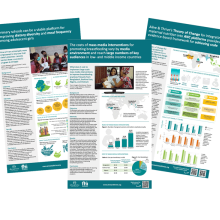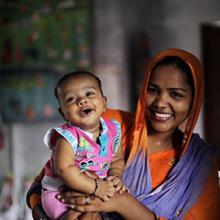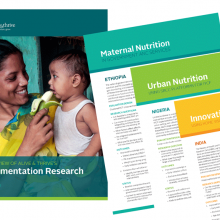Presentation
Jan 12 2023

Adolescent nutrition, maternal nutrition theory of change and media costs posters presented at the SBCC Summit
Three posters on mass media costing, scaling up maternal nutrition, and school-based nutrition highlight results from some of Alive & Thrive's implementation research in Africa and Asia. They were shared at the 2022 SBCC Summit in Marrakech, Morocco, in December.
Journal article
Jun 16 2022

Determinants of Adolescent Nutrition Status and Practices in Burkina Faso Using a Pooled Secondary Analysis (Godha D, Likhite N, 2022, Cur Dev Nutrition)
This study showed a strong association between high dietary diversity and unhealthy food intake namely added sugar consumption among adolescents in Burkina Faso, an important consideration for policy makers as they design adolescent nutrition programs to reduce malnutrition.
Announcement
May 31 2022

South Asia Newsletter
Subscribe to and read our monthly South Asia Newsletter to stay up to date on all of Alive & Thrive's activities across the South Asia region.
Brief, Handout
Oct 28 2020

An overview of Alive & Thrive's implementation research
Alive & Thrive's implementation research spans its program areas, seeking to answer "how" to implement effective interventions and policies. Active studies are detailed in the attached documents.
Journal article
Feb 25 2020

Nutrition intervention using behavioral change communication without additional material inputs increased expenditures on key food groups in Bangladesh (Warren AM., 2020. Journal of Nutrition)
This article demonstrated that recipients in the Phase I intensive intervention, which provided interpersonal counseling, community mobilization, and mass media campaigns, mobilized additional resources to improve diets.
Journal article
May 01 2018

Dietary diversity predicts the adequacy of micronutrient intake in pregnant adolescent girls and women in Bangladesh, but use of the 5-group cutoff poorly identifies individuals with inadequate intake (Nguyen PH., 2018. Journal of Nutrition)
The Minimum Dietary Diversity for Women (MDD-W) indicator based on a 10-food group women dietary diversity score (WDDS-10) has been validated to assess dietary quality in nonpregnant women.

